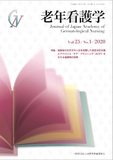Japanese
English
- 販売していません
- Abstract 文献概要
- 参考文献 Reference
抄録
本研究の目的は,救命救急病棟でせん妄を発症した高齢患者に付き添う妻がどのような体験をしているかを明らかにすることである.救命救急病棟でせん妄を発症した高齢患者に付き添う妻6人を対象に半構造化面接を実施し,質的記述的に分析した.その結果,【せん妄症状に心がかき乱される】【夫の状況を自分なりに解釈してみる】【病棟の環境に気を遣いながら夫の対応をする】【制限を受けている夫をかわいそうに思う】【状態が悪くならないように動くことをがまんさせる】【夫婦での今後の生活を案じる】の6つのカテゴリーが抽出された.妻は夫の言動の意味を共にすごしてきた夫婦の歴史から紐解いていたことが推察される.そして,妻が夫のことを理解してあげられる存在としてなにかしたいという思いがあることがうかがえた.看護師は妻と共にできる援助があればいっしょに行い,妻の行為が夫のせん妄の回復に寄与していることを伝えていくことが妻への支援につながるのではないかと考える.
The objective of this study was to reveal experiences of wives accompanying elderly patients with complications of delirium in a critical emergency ward. A qualitative and descriptive analysis was performed on the basis of the results of semi-structured interviews of six wives accompanying their elderly husbands with complications of delirium in a critical emergency ward. The results show that the experiences of the wives can be classified into the following six categories: being disturbed by delirium, interpreting their husband's condition in their own way, taking care of their husband in consideration of the ward environment, feeling sorry for their husband under certain restrictions, restraining their husband from moving in order to prevent his condition from worsening, and worrying about their future life with their husband. The categories of the experiences suggest that the wives understand their husbands' words and behaviors on the basis of their history of living together as a couple. The categories also suggest that the wives have a desire to assist their husbands as the one who can best understand them. Nurses should provide patients with necessary aid that can be shared with the wives and tell them that their actions contribute positively to their husbands' recovery from delirium, which will result in support for the wives.
Copyright © 2020, Japan Academy of Gerontological Nursing All rights reserved.


